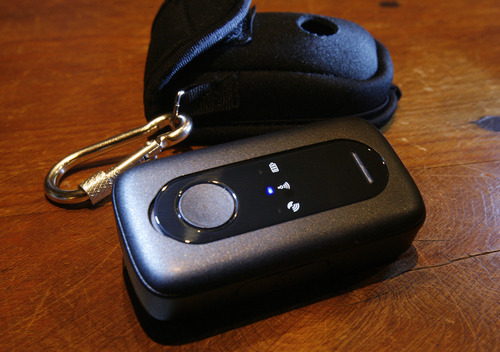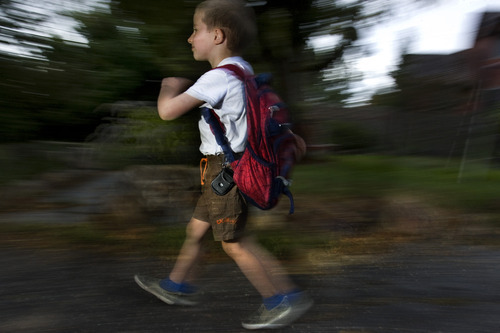This is an archived article that was published on sltrib.com in 2012, and information in the article may be outdated. It is provided only for personal research purposes and may not be reprinted.
There is no greater heart-stopping fear for a parent than a missing child. Even if it's for just a few minutes at a busy park or a crowded subway, a toddler out of reach can be a chilling experience.
That's why South Jordan-based Amber Alert GPS makes a portable tracker for kids that can alert parents to their children's locations.
The latest version of its device, the Amber Alert GPS, is out, and I put it to the test with both of my daughters to see if it would give me peace of mind. Despite loads of useful features, it didn't give me enough.
The Amber Alert GPS is a small gadget, about the size of a Zippo lighter. It uses satellite and cellphone technology for tracking. Your child can either put it in a pocket with its accompanying pouch or connect it to a backpack.
The device sends out a constant ping that enables a parent to monitor their child's whereabouts by checking their location on a map either online or through an app available for the iPhone or Android handset.
This is a feature that's no different than any smartphone with a built-in GPS receiver. Devices such as the iPhone have their own tracking services, including Find My Friends, or can be turned into tracking devices through third-party apps such as Life360 or Lookout. But Amber Alert GPS is really built for young children who don't yet have a phone.
The Amber Alert GPS also has a few more features that set it apart from a smartphone that can be tracked:
• You can set up a zone, say your home, in which a text or email can be sent to you whenever your child leaves or enters that area.
• The device also can alert parents whenever their child is moving faster than a certain speed. This enables you to know whether your child is in a car.
• The service also is tied to the National Sex Offender Registry and can alert you if your child is near the home of a convicted sex offender.
• It has an SOS panic button that if pushed by a child can send alerts to the cellphones of up to 10 trusted people.
• The newest version also has two-way calling. By pressing a button for four seconds, a child can initiate a call with their parent.
• It also has a "breadcrumb" feature that can show you on a map the trail of where the child has been.
All of the above features work, just not as accurately or as quickly as you may want.
I set up a 1,000-foot zone around my home to alert me whenever one of my daughters left the house. The problem was I would get the text up to a half hour after she left. The same was true whenever the device was moving faster than the 30 mph I had set for alerts. The warnings often took five minutes to reach me, and in a couple of instances, the alerts didn't come to me at all.
In general, the GPS seemed slow and inaccurate, especially if it was indoors, where it may not have had a clear line-of-sight to the satellites. Half the time, a map would show the device was across the street, even though it was in my house. Once, the map said my daughter was at school, but she was actually home. There wasn't another update for an hour.
The last day I tested it, the map said the device was nearly two blocks away from where it actually was and that it was moving at a constant 26 mph, even though it was sitting on my desk. I found the GPS in my iPhone to be more consistently accurate.
The two-way calling worked, but the call button was in the middle of the device, leading one of my daughters to "pocket dial" me by accident when it rubbed up against something in her backpack.
Another downside is the device needs to be recharged every day because a single charge barely lasts an entire day.
Again, the faults of the Amber Alert GPS probably have more to do with accuracy and timeliness rather than the device itself because the services generally work, just not efficiently, especially in a crisis situation.
But also problematic is the cost. The device is priced at $199, but you also have to pay a monthly fee. There are three tiers that range from $14.99 to $24.99, depending on the level of services. The company also offers discounts on the device if you commit to contracts of up to three years.
Although the Amber Alert GPS — or any other device —is never a replacement for responsible parenting, it's still a great concept to help keep young children safe. I just wish it was more dependable and accurate than it showed in my tests.
Google+: +Vincent Horiuchi





